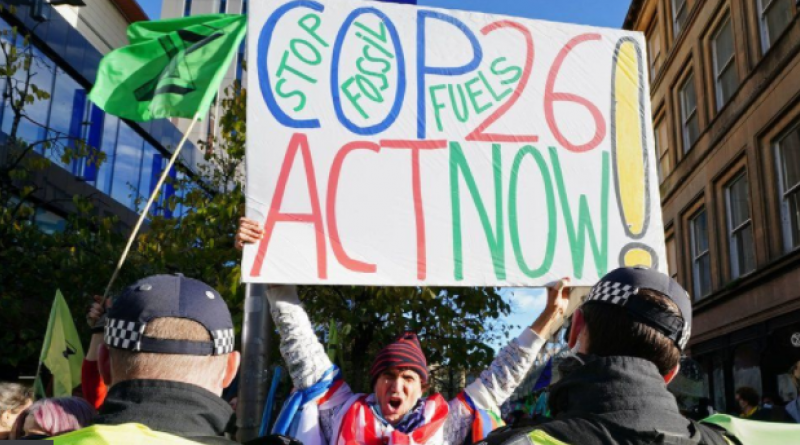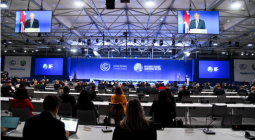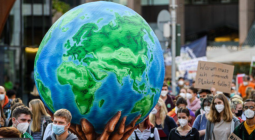Op - COP26 climate change summit: So far, so good-ish

Let's start with the bad news. Governments are far, far from achieving their goal to limit global temperature rise to 1.5C.
We've already got dangerous warming in the form of floods, record heatwaves and wildfires, with a rise of just 1.1C.
That's the natural world. But in the political world of COP26, things are looking a little brighter in the Glasgow sunshine.
Expectations for this conference were low, but seasoned COP observers have been pleasantly surprised by a slew of announcements which suggest the world is on an unstoppable path to a low-carbon future.
"The mood of the conference is good," Pete Betts, the former EU lead negotiator on climate change told me.
"The trend towards a zero-carbon world is irreversible. The question is when we get there, and what the climate will be like by then."
His relative optimism can be explained by some of announcements made at the summit so far:
- Money: Rich nations have clumsily failed to deliver their promised $100bn to poor countries by 2020. But the former Bank of England governor Mark Carney is looking to move trillions of dollars of private capital towards supporting clean technology. He has gathered 450 organisations controlling 130 trillion dollars, or around 40% of global private assets, and they plan to shift finances to activities that help the move towards zero carbon, such as renewable energy. Critics complain the financial institutions will be allowed to invest in fossil fuels, but it's a serious and novel offer
- Trees: More than 100 countries promised to reverse deforestation by 2030. The pledge includes almost £14bn ($19.2bn) of public and private funds. We've seen similar initiatives before, but this one's better funded
- Methane: There's a pact to cut emissions of the world's second-worst warming gas, methane, by 30% by 2030. Big emitters China, Russia and India haven't signed, but it's hoped they will join later
- Creating markets: Forty nations led by the UK and including China, India and the US, will impose standards, incentives and rules, to create markets for new technologies. This could be transformative if it works. The partners might, for instance, agree a date by which a certain percentage of steel is made without using coal. This would give investors the confidence to know that markets for innovative technologies would be available, and could radically lower the price of clean tech worldwide
- Clean energy: In what could be a new paradigm for helping countries to transition to clean energy, South Africa will get £6bn ($8.5 billion) to ditch coal, in a deal with France, Germany, the UK, the US and the EU
- India: Prime Minister Modi has set aggressive targets for low-carbon power by 2030. Some people are worried that he doesn't plan to end greenhouse gases until 2070 - but the world will have changed completely by then, and India is likely to be forced economically come into step
- UK rules: Most big UK firms and financial institutions will be asked to show how they intend to hit climate change targets. Plans will be submitted to an expert panel to ensure they are not just spin
Kat Kramer from Christian Aid, which campaigns on climate change, says the many announcements are a positive sign.
"The COP itself is a consensus process, so it's a lowest common denominator. What we're seeing is other initiatives bolted on to the COP - there's real momentum."
So far so good, then. But there have been disappointments.
It had been expected that China would improve its offer to peak emissions by 2030. At least a token gesture was anticipated, but it's brought nothing.
The only consolation for the COP is that China usually over-delivers on its promises - unlike some others.
Take the US. Former Presidents George Bush Jnr and Donald Trump both withdrew the US from the Paris climate agreement.
The election of a Republican governor in Virginia yesterday raises the spectre of Mr Trump's possible return, which would probably undo climate measures all over again.
Negotiators will now get down to the messy task of sorting out a rule book, so that nations can trust each other's carbon-cutting plans.
They'll be rowing about the lack of government finance for poor countries, and the need for more money to adapt to global heating. And they want "loss and damage" - code for compensation for harm done to them by the emissions of poor nations.
The Virginia news won't help trust - but there's a feeling that by the standards of many COPs, this has got off to a good start.
Roger Harrabin has been covering climate change for 35 years. The first UN climate meeting he reported from was the Rio de Janeiro Earth Summit in 1992.
3 November 2021
BBC





